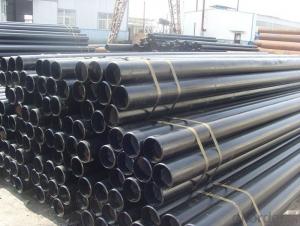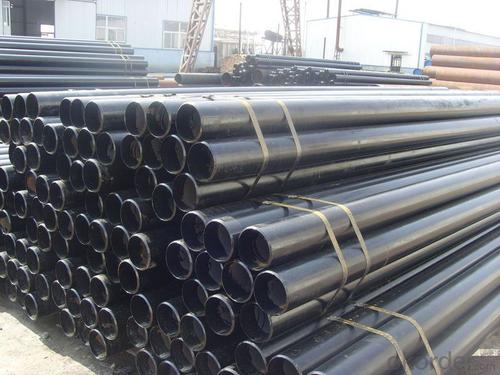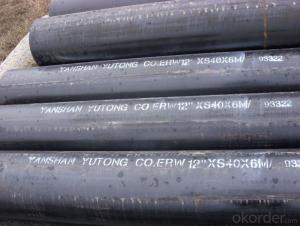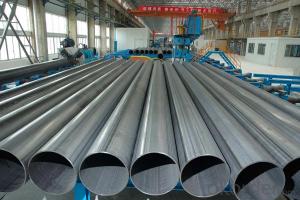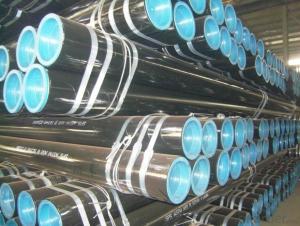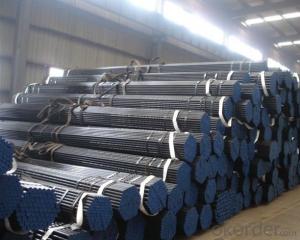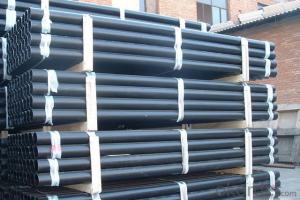ASTM A53 Gr.B Seamless Steel Tubes And Pipes
- Loading Port:
- China Main Port
- Payment Terms:
- TT or LC
- Min Order Qty:
- 25 m.t.
- Supply Capability:
- 8000-10000 m.t./month
OKorder Service Pledge
OKorder Financial Service
You Might Also Like
1、Structure of ASTM A53 Gr.B Seamless Steel Tubes And Pipes:
Seamless pipe is formed by drawing a solid billet over a piercing rod to create the hollow shell. As the manufacturing process does not include any welding, seamless pipes are perceived to be stronger and more reliable. Historically seamless pipe was regarded as withstanding pressure better than other types, and was often more easily available than welded pipe.
2、Main Features of the ASTM A53 Gr.B Seamless Steel Tubes And Pipes:
• High manufacturing accuracy
• High strength
• Small inertia resistance
• Strong heat dissipation ability
• Good visual effect
• Reasonable price
3、ASTM A53 Gr.B Seamless Steel Tubes And Pipes Specification:
Standard | GB, DIN, ASTM ASTM A106-2006, ASTM A53-2007 |
Grade | 10#-45#, 16Mn 10#, 20#, 45#, 16Mn |
Thickness | 8 - 33 mm |
Section Shape | Round |
Outer Diameter | 133 - 219 mm |
Place of Origin | Shandong, China (Mainland) |
Secondary Or Not | Non-secondary |
Application | Hydraulic Pipe |
Technique | Cold Drawn |
Certification | API |
Surface Treatment | factory state or painted black |
Special Pipe | API Pipe |
Alloy Or Not | Non-alloy |
Length | 5-12M |
Outer Diameter | 21.3-610mm |
Grade | 20#, 45#, Q345, API J55, API K55, API L80, API N80, API P110, A53B |
Standard | ASME, ASTM |
1) Material:20#(ASTM A 106/A53 GRB.API5LGRB,GB),45#,16Mn,10#.
2) Specification range:OD:21.3-610mm,WT:6-70mm,length:6-12m or according to the requirement of clients.
3) Excutive standards:GB,ASME API5L.ASTM A 106/A53,Despite of the above standards,we can also supply seamless steel pipe with standard of DIN,JIS,and so on,and also develop new products according to the requirements of our clients!
4) Surface:black lacquered,varnish coating or galvanized.
5) Ends:Beveled or square cut,plastic capped,painted.
6) Packing:bundles wrapped with strong steel strip,seaworthy packing.
4、Packaging & Delivery
Packaging Details: | seaworthy package,bundles wrapped with strong steel strip |
Delivery Detail: | 15-30days after received 30%TT |
5、FAQ of ASTM A53 Gr.B Seamless Steel Tubes And Pipes:
①How is the quality of your products?
Our products are manufactured strictly according to national and internaional standard, and we take a test
on every pipe before delivered out. If you want see our quality certifications and all kinds of testing report, please just ask us for it.
Guaranteed: If products’ quality don’t accord to discription as we give or the promise before you place order, we promise 100% refund.
②How about price?
Yes, we are factory and be able to give you lowest price below market one, and we have a policy that “ for saving time and absolutely honest business attitude, we quote as lowest as possible for any customer, and discount can be given according to quantity”,if you like bargain and factory price is not low enough as you think, just don’t waste your time.Please trust the quotation we would give you, it is professional one.
③Why should you chose us?
Chose happens because of quality, then price, We can give you both.Additionally, we can also offer professional products inquiry, products knowledge train(for agents), smooth goods delivery, exellent customer solution proposals.Our service formula: good quality+good price+good service=customer’s trust
SGS test is available, customer inspection before shipping is welcome, third party inspection is no problem.
6、Seamless Pipe ASTM A106/53 Images:
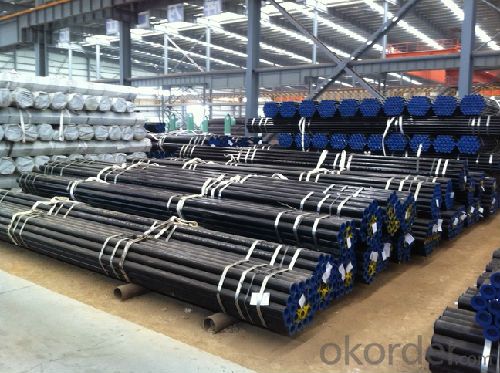
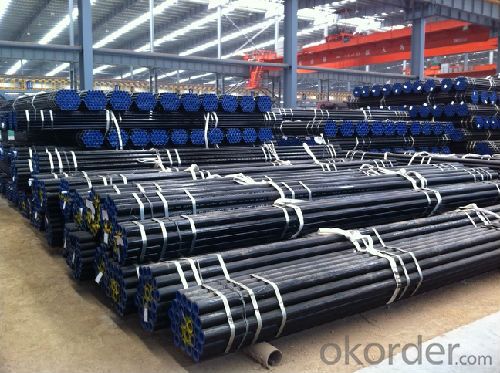
- Q: How do steel pipes perform in corrosive environments?
- Steel pipes perform well in corrosive environments due to their natural corrosion resistance. The addition of protective coatings or linings further enhances their performance, making them highly durable and suitable for a wide range of applications in such environments.
- Q: Can steel pipes be used for plumbing?
- Yes, steel pipes can be used for plumbing. Steel pipes are commonly used for plumbing applications due to their strength, durability, and resistance to corrosion. However, other materials such as copper and PVC are also commonly used depending on the specific requirements and preferences of the plumbing system.
- Q: How are steel pipes insulated to prevent freezing?
- Steel pipes are typically insulated using materials such as foam or fiberglass insulation, which are wrapped around the pipes. This insulation helps to prevent freezing by providing a barrier between the cold temperatures outside and the pipes, thus maintaining the necessary heat inside the pipes to prevent freezing.
- Q: What are the advantages of using steel pipes in the manufacturing of storage tanks?
- There are several advantages of using steel pipes in the manufacturing of storage tanks. Firstly, steel pipes are highly durable and have a longer lifespan compared to other materials, ensuring the longevity of the storage tank. Secondly, steel pipes have high strength and can withstand high pressure and extreme temperatures, making them suitable for storing a wide range of substances. Additionally, steel pipes are resistant to corrosion and can be coated to further enhance their protection against rust and other chemical reactions. Lastly, steel pipes are readily available and can be easily fabricated, making them a cost-effective choice for the manufacturing of storage tanks.
- Q: How are steel pipes used in the construction of nuclear power plants?
- Steel pipes are used in the construction of nuclear power plants for various purposes, including transporting coolant, steam, and gases, as well as providing structural support for the overall system. These pipes are specifically designed to withstand high pressures, extreme temperatures, and corrosive environments, ensuring the safe and efficient operation of the nuclear power plant.
- Q: Are steel pipes suitable for use in acidic environments?
- No, steel pipes are generally not suitable for use in acidic environments because they are prone to corrosion in such conditions.
- Q: What is the difference between hot-dip galvanizing and electroplating of steel pipes?
- Steel pipes can be protected from corrosion using two different methods: hot-dip galvanizing and electroplating. To protect steel pipes using hot-dip galvanizing, they are immersed in a molten bath of zinc. The zinc reacts with the steel to create a strong and uniform coating that effectively prevents corrosion. This method is commonly used for outdoor applications and in harsh environments where the pipes are exposed to water or chemicals. In contrast, electroplating involves depositing a thin layer of metal, usually zinc, onto the surface of the steel pipes using an electric current. The steel pipes act as the cathode, and a zinc anode is placed in a solution containing zinc ions. The electric current causes the zinc ions to react with the steel and form a thin coating. Electroplating is often chosen for indoor applications or when aesthetics are a priority. Hot-dip galvanizing generally provides a thicker and more durable coating compared to electroplating. The hot-dip galvanized coating is several times thicker than the electroplated zinc coating, offering better corrosion protection and a longer lifespan for the pipes. The appearance of the coatings also differs. Hot-dip galvanizing results in a matte gray finish, while electroplating can give a more lustrous and shiny appearance. Cost-wise, hot-dip galvanizing is more cost-effective for larger projects because it can coat multiple pipes simultaneously. On the other hand, electroplating is usually more expensive and time-consuming, especially for larger quantities of steel pipes. Ultimately, the choice between hot-dip galvanizing and electroplating depends on the specific requirements of the project, including the intended application, environment, aesthetics, and budget constraints.
- Q: What industries typically use steel pipes?
- Industries such as construction, oil and gas, water treatment, automotive, and manufacturing typically use steel pipes.
- Q: How do steel pipes handle seismic activities?
- Steel pipes are highly durable and flexible, making them well-suited for handling seismic activities. The inherent strength and elasticity of steel allow the pipes to withstand ground movements during earthquakes without fracturing or collapsing. Additionally, steel pipes can absorb and distribute seismic forces throughout their structure, reducing the risk of damage or failure.
- Q: What does carbon seamless steel pipe mean? What is the difference between a seamless 20# and an ordinary one? What is it used in detail?
- Carbon steel is actually relative to alloy steel, mainly carbon content, and 20# seamless steel is carbon steel! In addition, there are stainless steel, stainless steel is considered a kind of alloy steel, but the processing is not the same, the performance is not the same, good looking outside!The description of the material in alloy steel is actually the content of the metal elements in the steel (usually the percentage number).
Send your message to us
ASTM A53 Gr.B Seamless Steel Tubes And Pipes
- Loading Port:
- China Main Port
- Payment Terms:
- TT or LC
- Min Order Qty:
- 25 m.t.
- Supply Capability:
- 8000-10000 m.t./month
OKorder Service Pledge
OKorder Financial Service
Similar products
Hot products
Hot Searches
Related keywords
